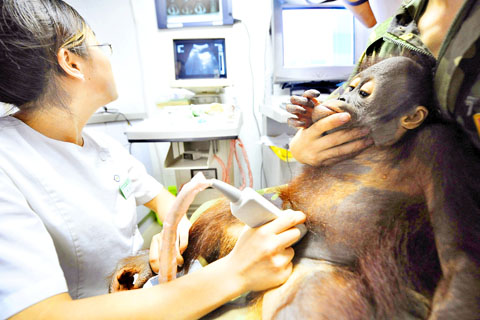Minister of Health Lin Fang-yue (林芳郁) stepped down yesterday over panic caused by the discovery of contaminated Chinese dairy ingredients and what critics said were belated and inconsistent measures to protect the public and ensure consumer confidence.
“The Department of Health’s [DOH] decision, made for efficiency’s sake, caused misunderstandings and shattered consumer confidence. I should take responsibility,” Lin said at a press conference yesterday morning after attending the weekly Cabinet meeting, during which he tendered his resignation to Premier Liu Chao-shiuan (劉兆玄).
Lin’s resignation was approved later yesterday, making him the first official in President Ma Ying-jeou’s (馬英九) administration to step down. The DOH was first blamed for its slow reaction to and mismanagement of the crisis involving Chinese dairy products tainted with the chemical melamine, and then for its inconsistent decisions.

PHOTO: AP
Deputy ministers of health Sung Yen-jen (宋晏仁) and Cheng Shou-hsia (鄭守夏) tendered resignation letters together with Lin.
Liu also approved the resignation of Bureau of Food Safety (BFS) Director Hsiao Tung-ming (蕭東銘).
Late last night, Presidential Office Deputy Secretary-General Yeh Ching-chuan (葉金川), a public health expert, was named as the next health minister.
Critics said the department should have banned dairy imports from China, checked with importers to see if imported products were tainted, and ordered an inspection or sampling of Chinese imports that had reached Taiwan.
Lin’s resignation comes as many consumers and businessmen express frustration over the DOH’s “loose” food inspection standards.
Late on Wednesday night, Sung told a press conference that the DOH had decided to loosen the food safety standard for melamine from 0 parts per million (ppm) to 2.5ppm, meaning that products containing up to 2.5ppm of the chemical could still enter the Taiwanese market.
Based on the new standard, the products of two food companies, which tested positive for melamine under the stricter standard, were allowed to go back on sale, sparking consumer anger.
The DOH said the revised standard was applied after taking into consideration instrument sensitivity and standards in other countries.
Executive Yuan Spokeswoman Vanessa Shih (史亞平) told a press conference yesterday that Liu met with Lin in the afternoon and expressed the hope that Lin would remain in his post.
“But Minister Lin insisted on resigning,” Shih said.
Liu praised Lin for his handling of the controversy, saying the DOH had taken accurate and forthright action from the beginning of the incident to impose bans on imports, to locate the whereabouts of tainted raw materials and to require questionable foodstuffs to be pulled from shelves, Shih said.
Liu had also expressed his admiration over Lin taking political responsibility for the late change in testing standards for the concentration of melamine that caused the unrest, and thanked him for his contributions over the past four months, Shih said.
Later yesterday afternoon, Lin was questioned by Control Yuan member Cheng Jen-hung (程仁宏), who has launched a probe to determine if there were any irregularities or instances of negligence in the government’s handling of the case.

FAST RELEASE: The council lauded the developer for completing model testing in only four days and releasing a commercial version for use by academia and industry The National Science and Technology Council (NSTC) yesterday released the latest artificial intelligence (AI) language model in traditional Chinese embedded with Taiwanese cultural values. The council launched the Trustworthy AI Dialogue Engine (TAIDE) program in April last year to develop and train traditional Chinese-language models based on LLaMA, the open-source AI language model released by Meta. The program aims to tackle the information bias that is often present in international large-scale language models and take Taiwanese culture and values into consideration, it said. Llama 3-TAIDE-LX-8B-Chat-Alpha1, released yesterday, is the latest large language model in traditional Chinese. It was trained based on Meta’s Llama-3-8B

STUMPED: KMT and TPP lawmakers approved a resolution to suspend the rate hike, which the government said was unavoidable in view of rising global energy costs The Ministry of Economic Affairs yesterday said it has a mandate to raise electricity prices as planned after the legislature passed a non-binding resolution along partisan lines to freeze rates. Chinese Nationalist Party (KMT) lawmakers proposed the resolution to suspend the price hike, which passed by a 59-50 vote. The Taiwan People’s Party (TPP) voted with the KMT. Legislative Speaker Han Kuo-yu (韓國瑜) of the KMT said the resolution is a mandate for the “immediate suspension of electricity price hikes” and for the Executive Yuan to review its energy policy and propose supplementary measures. A government-organized electricity price evaluation board in March

NO-LIMITS PARTNERSHIP: ‘The bottom line’ is that if the US were to have a conflict with China or Russia it would likely open up a second front with the other, a US senator said Beijing and Moscow could cooperate in a conflict over Taiwan, the top US intelligence chief told the US Senate this week. “We see China and Russia, for the first time, exercising together in relation to Taiwan and recognizing that this is a place where China definitely wants Russia to be working with them, and we see no reason why they wouldn’t,” US Director of National Intelligence Avril Haines told a US Senate Committee on Armed Services hearing on Thursday. US Senator Mike Rounds asked Haines about such a potential scenario. He also asked US Defense Intelligence Agency Director Lieutenant General Jeffrey Kruse

NOVEL METHODS: The PLA has adopted new approaches and recently conducted three combat readiness drills at night which included aircraft and ships, an official said Taiwan is monitoring China’s People’s Liberation Army (PLA) exercises for changes in their size or pattern as the nation prepares for president-elect William Lai’s (賴清德) inauguration on May 20, National Security Bureau (NSB) Director-General Tsai Ming-yen (蔡明彥) said yesterday. Tsai made the comment at a meeting of the Legislative Yuan’s Foreign Affairs and National Defense Committee, in response to Democratic Progressive Party (DPP) Legislator Wang Ting-yu’s (王定宇) questions. China continues to employ a carrot-and-stick approach, in which it applies pressure with “gray zone” tactics, while attempting to entice Taiwanese with perks, Tsai said. These actions aim to help Beijing look like it has